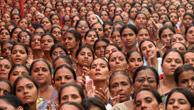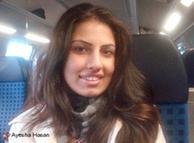Turning attention to women’s rights in South Asia
 Spotlighting women’s issues in South Asia is the focus of a recently introduced multimedia project at Deutsche Welle. Three young female journalists from Pakistan, Afghanistan and India were sponsored by the Friedrich Ebert Foundation to help launch the undertaking in Bonn.
Spotlighting women’s issues in South Asia is the focus of a recently introduced multimedia project at Deutsche Welle. Three young female journalists from Pakistan, Afghanistan and India were sponsored by the Friedrich Ebert Foundation to help launch the undertaking in Bonn.
Their online dossiers feature reports in Hindi, Urdu, Dari and English on topics such as maternal mortality and healthcare, women’s rights and the role of women in business and society.
“Good journalism promotes positive changes in society,” says Ayesha Hasan of Pakistan, one of the visiting journalists who participated in the kick-off of the Women’s World project in late 2011. Reflecting on the role of free media, Hasan says they “can bring about peace within Pakistan as well as with its neighbors.”
 That also reflects the aims of DW-AKADEMIE’s several long-term projects in the region. For example the development of children’s TV programming in cooperation with the University of Peshawar and a TV station in Afghanistan for Pakistani and Afghani journalists. DW-AKADEMIE also conducts training workshops for regional affiliates of the Pakistani Broadcasting Corporation PBC. Some of the participating journalists come from extremely remote parts of Pakistan.
That also reflects the aims of DW-AKADEMIE’s several long-term projects in the region. For example the development of children’s TV programming in cooperation with the University of Peshawar and a TV station in Afghanistan for Pakistani and Afghani journalists. DW-AKADEMIE also conducts training workshops for regional affiliates of the Pakistani Broadcasting Corporation PBC. Some of the participating journalists come from extremely remote parts of Pakistan.
In this interview, Ayesha Hasan, who is based in Khyber Pakhtunkhwa province, describes her experience as a journalist in Pakistan and as a visiting reporter in Germany.
Pakistan is an Islamic republic. How difficult is it to write about religious themes?
“It is very difficult. One can actually write about all possible issues, lifestyle, celebrities and health. But religion in Pakistan affects all social spheres. If you report on issues like violence against a woman, many groups will try and defame the woman, who is not a victim for them, but actually the criminal because her clothes or her behavior are against religious norms. The same is also true for women who are abused by their husbands.
Religious groups usually do not consider writing about such issues as a violation of Islamic law, but the journalist doing so definitely comes under scrutiny because there is a suspicion that he or she does not accept Islamic law completely. These groups believe that Islamic law is on their side, but Islam is not a religion of violence. There are some groups of people who do wrong things in the name of religion.”
Have you or the newspaper you work for ever faced dangerous situations?
“A short while ago we published a few blogs on our website about sexual orientations and homosexuality. Many groups called for the website to be boycotted and started an online campaign against the newspaper and the publishing company.
They accused us of being against our religion. It is very easy to sway public opinion in Pakistan either in favor of or against an issue. This can be dangerous for a newspaper, a publishing house and also for individuals and journalists. The people in Pakistan also love to exaggerate news.”
You belong to the northwest Pakistani province of Khyber Pakhtunkhwa, which is particularly unstable politically. How difficult is news coverage when it comes to politics?
“Politics is also a difficult subject, especially when one researches and deals with powerful people. For small issues, one could lose one’s job and for big issues one could be killed. Saleem Shahzad, who wrote about the Pakistani intelligence agency’s possible involvement in the Karachi naval base attacks following the killing of Osama bin Laden on May 2nd, 2011, in Abbotabad was killed soon after on May 22nd. One gets the impression that the government is not seriously interested in clarifying the murder and wants to portray journalism in a bad light. Journalism is not a business, it is a responsibility.”
How can a free media promote peace in Pakistan?
“Media for me is the most important actor in working towards a peaceful society. Media organizations are communicators; they transport images of people and communities. They can bring about peace within Pakistan as well as with its neighbors. That is why we should also report more about mutual interest with other countries, rather than exaggerating conflict.
Journalism can remove the aggressiveness from politics by using facts and by reporting accurately. In Pakistan unfortunately there is a lot of sensational journalism, bad journalism, which creates news instead of communicating information neutrally. This should stop.”
 What challenges have you faced as a journalist?
What challenges have you faced as a journalist?
“In the future I want to write more about hard themes, about politics and women’s issues. In the province where I live, women are not aware of their rights, many are illiterate. Some of them have access to the media only when they go to clean the rooms of male members of their families. The men usually keep television sets in their rooms. I feel my responsibilities are three-fold: as a journalist, as a Pakistani and as a Pashtun. Good journalism promotes positive changes in society and forces politicians to reflect upon a social problem. Women journalists are not taken seriously in Pakistan. Most employers assign them soft beats like culture and lifestyle, fashion and society. This concept needs to change if more and more women are to become serious journalists.”
In this audio clip, Ayesha Hasan describes how her working visit to Germany has helped her grow both personally and professionally.
Ayesha Hasan by DW-Akademie Asia
Interview by: Martina Bertram




Feedback